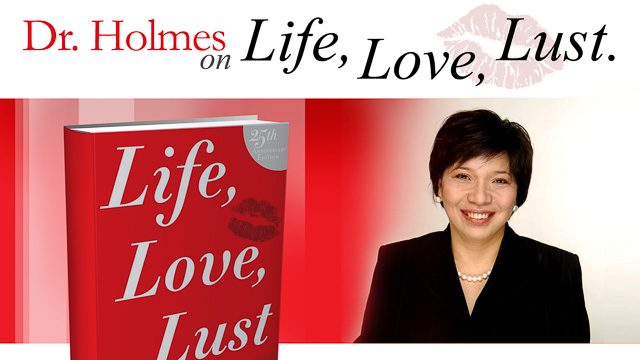SUMMARY
This is AI generated summarization, which may have errors. For context, always refer to the full article.

For the past few years, there have been endless discussions about reproductive health, sexuality education, and gender identity. In the past few months, conversations have been dominated by debates – often quite heated – about same-sex marriage, HIV in the Philippines, and Caitlyn Jenner.
It’s easy to forget that all these issues revolve around relationships. Human beings are defined by their feelings, urges, desires, preferences, histories, education, experience, and upbringing. All of these things play a big part in all aspects of all relationships, from decision-making to actions both regrettable and commendable.
Relationships – with others and with ourselves – take center stage in Life Love Lust: Straightforward Answers to Provocative Questions by clinical psychologist Margarita Go Singco-Holmes, PhD. Life Love Lust – or LLL, as Holmes calls the book – was originally published in 1990, and Anvil Publishing has just released a 25th anniversary edition. The book is a collection of letters written by avid readers to Holmes over the years: letters offered up in exchange for sympathy and advice as delivered through her columns across various publications.
Back in 1990, Holmes shares, LLL was “denounced by priests and pundits as a threat to decency and morality.” Holmes herself was “accused of being a nymphomaniac, of being a mere psychologist masquerading as a real doctor, and of being a bad influence for the youth.” While many condemned it, there were also many who supported, even celebrated it: newspaper columnists, the academe, psychology students. The book made waves, and forced readers to admit that yes, people have sex.
In 2015, is a book like LLL still relevant? People are much more willing to talk about sex and all the related topics: in various columns, on social media, on the radio, in magazines.
One might wonder about the relevance of letters written 25 years ago. Others might suggest that there is no point in publishing a whole book when it’s so easy to Google when you have questions. But Holmes – and her husband and fellow columnist, Jeremy Baer – still have a thing or two to teach us.
People try very hard to live with both their faith and sexuality.
One recurring theme is the question of sex as a sin. Many letter writers are torn between sexual desires and the tenets of their faith. Sometimes the questions seem better suited for a priest or a spiritual adviser. Is masturbation a sin? How do I forgive my husband the serial philanderer? Many people still struggle with these dilemmas.
Sometimes faith clashed with practicality. One woman moved in with her boyfriend in order to save on rent; to avoid the sin of premarital sex, they did everything but penetrative sex. As with all supplicants, Holmes shared her vast medical knowledge along with practical advice, but recommended the aid of someone from their church to resolve their moral dilemmas.
Some things change, some things stay the same.
Some letters are dated. The cost of a cabaret dance, means of communication, and even mention of the December coup during Corazon Aquino’s presidency: these remind us that some of the letters were written over 20 years ago. Times have changed, but many concerns remain the same: fidelity in a marriage, the merits and demerits of a long-distance relationship, first sexual encounters.
A broad spectrum of cases is brought before Holmes. The worries of each person are different, the solutions varied, the research says one thing or another. Some are clearly medical concerns. But most are ethical, psychological, moral or emotional dilemmas, and so Holmes asks mostly the same questions. Why is this really bothering you? What do you really want? What is important to you? Though Holmes frequently states that the column is no substitute for therapy and counseling, the process is at least initiated when the reader begins to reevaluate and rethink.

Sometimes you just need to face the facts.
You’ve been there: You have a problem, and you complain to your friends. One friend says exactly what you need to hear, but you don’t want to hear it because you’re looking for sympathy. So you angrily turn away.
Some readers might feel like Holmes’ husband, Jeremy Baer, is like that honest and sensible friend. Baer is not a clinical psychologist like Holmes, but his replies cut to the chase and offer practical advice based on personal experience.
Filipinos may find his Western speech – direct, blunt, straightforward, sometimes sarcastic, jarring, even unpleasant or downright harsh, but sometimes people need a slap in the face before they’ll listen. Because Baer gets the sensible life advice out of the way, Holmes is able to focus on a reply that’s based on the science and research that is her expertise. And so the letter writer is gifted with a response that is truly two-pronged: the facts of life from Baer, and the facts of science from Holmes. That’s something LLL didn’t have in 1990!
Everyone has sex – even lolo and lola!
People tend to associate sexual urges with horny teenagers, philandering husbands and nymphomaniacs. But LLL reminds us that even senior citizens, couples who have been married for decades, and persons with disabilities are more than marginalized populations in need of Viagra or a distraction. They have sexual urges! And they are perfectly capable of having satisfying, exciting sex lives.
Their letters to Holmes reveal dilemmas unfamiliar to the general populace. Where does one meet single seniors? Did you know there are dating sites for the disabled? Can a woman over 60 years old still have orgasms during intercourse?
Women like sex!

An entire chapter is devoted to “Female Sexual Concerns,” and why not? Many people still seem to be uncomfortable with the idea of women enjoying sex, as opposed to women just having sex for procreation or to satisfy their husbands. But Holmes’ advice reminds us that women are sexual beings, capable of lust, passion, and orgasm. She explains the science of female sexual organs, and even provides a few pages of advice on what might be deemed the Holy Grail of sex: female orgasm during genital intercourse.
Sometimes it’s not about sex.
Don’t forget: Holmes is actually a clinical psychologist, fully trained to deal with a vast array of concerns beyond sex. In the chapter “Predominantly Psychological Concerns,” some letter writers still ask about sex, but there are clearly other issues at play: self-esteem, personal history, relationships, social contexts, and emotional status.
Frequently, Holmes sounds like a no-nonsense tita who will tell you the things your mother didn’t: Leave him or her. Take charge of your life. Do not put your life on hold. Do this for yourself, not for someone else.
Beyond hetero – and homosexuality
Fetishes, transgender love, yaoi. These words were probably beyond taboo back in 1990.
Today, there are many blogs, articles, documentaries, TED talks and campaigns that talk about cisnormativity and non-vanilla sexual practices, as well as the distress and confusion that accompany such misunderstood preferences and activities. In ”Sex Frills” and “LLL in the 21st Century,” Holmes talks about these and more in a sex-positive and sensible manner that doesn’t titillate, but educates and enlightens.
At the end of the book are a glossary and some “Extras,” providing definitions for terms and concepts that are likely unfamiliar to the reader. It would have been useful, however, to have a paragraph or two about BDSM in light of the recent Fifty Shades of Grey film, and what differentiates this activity from emotional, physical and sexual abuse, which some letters mention.
Holmes’ book talks about things that may now be familiar territory or common knowledge, but it also reminds us that people and their relationships are constantly evolving. Though some things are as true today as they were 25 years ago, so much has changed, and our sensibilities need to keep up.
Through LLL and her other writings, Holmes keeps us informed, encourages us to keep an open mind, and reminds us to take care of ourselves. Only by doing all these can we enter and maintain relationships that are happy, healthy and satisfying. That’s an idea that’s definitely relevant today, and will still be relevant 25 years from now. – Rappler.com
Like most writers, Regina Layug Rosero wears many hats: researcher, project manager, public speaker, editor. Various projects and employers have brought her around the world of fashion, advocacy, biotechnology, social media, geek culture, population and development, robotics, comic books and myriad other topics. What drives her through these roles and worlds is an insatiable curiosity, and an instinct to share these stories with others.
Add a comment
How does this make you feel?
There are no comments yet. Add your comment to start the conversation.